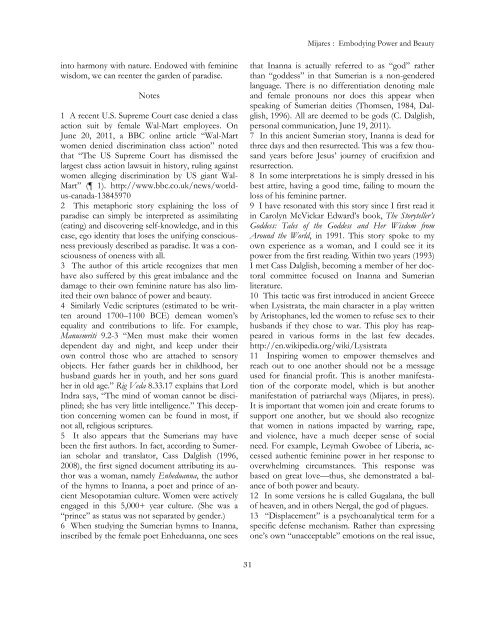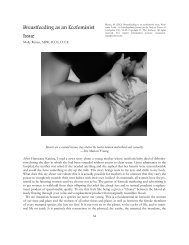RE:IJSNC, Issue 1, Volume 2, May 2012 - Ocean Seminary College
RE:IJSNC, Issue 1, Volume 2, May 2012 - Ocean Seminary College
RE:IJSNC, Issue 1, Volume 2, May 2012 - Ocean Seminary College
You also want an ePaper? Increase the reach of your titles
YUMPU automatically turns print PDFs into web optimized ePapers that Google loves.
into harmony with nature. Endowed with feminine<br />
wisdom, we can reenter the garden of paradise.<br />
Notes<br />
1 A recent U.S. Supreme Court case denied a class<br />
action suit by female Wal-Mart employees. On<br />
June 20, 2011, a BBC online article “Wal-Mart<br />
women denied discrimination class action” noted<br />
that “The US Supreme Court has dismissed the<br />
largest class action lawsuit in history, ruling against<br />
women alleging discrimination by US giant Wal-<br />
Mart” ( 1). http://www.bbc.co.uk/news/worldus-canada-13845970<br />
2 This metaphoric story explaining the loss of<br />
paradise can simply be interpreted as assimilating<br />
(eating) and discovering self-knowledge, and in this<br />
case, ego identity that loses the unifying consciousness<br />
previously described as paradise. It was a consciousness<br />
of oneness with all.<br />
3 The author of this article recognizes that men<br />
have also suffered by this great imbalance and the<br />
damage to their own feminine nature has also limited<br />
their own balance of power and beauty.<br />
4 Similarly Vedic scriptures (estimated to be written<br />
around 1700–1100 BCE) demean women’s<br />
equality and contributions to life. For example,<br />
Manusmriti 9.2-3 “Men must make their women<br />
dependent day and night, and keep under their<br />
own control those who are attached to sensory<br />
objects. Her father guards her in childhood, her<br />
husband guards her in youth, and her sons guard<br />
her in old age.” Rig Veda 8.33.17 explains that Lord<br />
Indra says, “The mind of woman cannot be disciplined;<br />
she has very little intelligence.” This deception<br />
concerning women can be found in most, if<br />
not all, religious scriptures.<br />
5 It also appears that the Sumerians may have<br />
been the first authors. In fact, according to Sumerian<br />
scholar and translator, Cass Dalglish (1996,<br />
2008), the first signed document attributing its author<br />
was a woman, namely Enheduanna, the author<br />
of the hymns to Inanna, a poet and prince of ancient<br />
Mesopotamian culture. Women were actively<br />
engaged in this 5,000+ year culture. (She was a<br />
“prince” as status was not separated by gender.)<br />
6 When studying the Sumerian hymns to Inanna,<br />
inscribed by the female poet Enheduanna, one sees<br />
31<br />
Mijares : Embodying Power and Beauty<br />
that Inanna is actually referred to as “god” rather<br />
than “goddess” in that Sumerian is a non-gendered<br />
language. There is no differentiation denoting male<br />
and female pronouns nor does this appear when<br />
speaking of Sumerian deities (Thomsen, 1984, Dalglish,<br />
1996). All are deemed to be gods (C. Dalglish,<br />
personal communication, June 19, 2011).<br />
7 In this ancient Sumerian story, Inanna is dead for<br />
three days and then resurrected. This was a few thousand<br />
years before Jesus’ journey of crucifixion and<br />
resurrection.<br />
8 In some interpretations he is simply dressed in his<br />
best attire, having a good time, failing to mourn the<br />
loss of his feminine partner.<br />
9 I have resonated with this story since I first read it<br />
in Carolyn McVickar Edward’s book, The Storyteller’s<br />
Goddess: Tales of the Goddess and Her Wisdom from<br />
Around the World, in 1991. This story spoke to my<br />
own experience as a woman, and I could see it its<br />
power from the first reading. Within two years (1993)<br />
I met Cass Dalglish, becoming a member of her doctoral<br />
committee focused on Inanna and Sumerian<br />
literature.<br />
10 This tactic was first introduced in ancient Greece<br />
when Lysistrata, the main character in a play written<br />
by Aristophanes, led the women to refuse sex to their<br />
husbands if they chose to war. This ploy has reappeared<br />
in various forms in the last few decades.<br />
http://en.wikipedia.org/wiki/Lysistrata<br />
11 Inspiring women to empower themselves and<br />
reach out to one another should not be a message<br />
used for financial profit. This is another manifestation<br />
of the corporate model, which is but another<br />
manifestation of patriarchal ways (Mijares, in press).<br />
It is important that women join and create forums to<br />
support one another, but we should also recognize<br />
that women in nations impacted by warring, rape,<br />
and violence, have a much deeper sense of social<br />
need. For example, Leymah Gwobee of Liberia, accessed<br />
authentic feminine power in her response to<br />
overwhelming circumstances. This response was<br />
based on great love—thus, she demonstrated a balance<br />
of both power and beauty.<br />
12 In some versions he is called Gugalana, the bull<br />
of heaven, and in others Nergal, the god of plagues.<br />
13 “Displacement” is a psychoanalytical term for a<br />
specific defense mechanism. Rather than expressing<br />
one’s own “unacceptable” emotions on the real issue,



